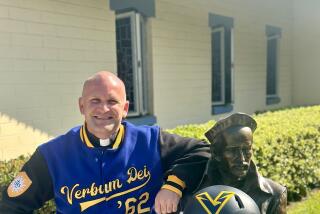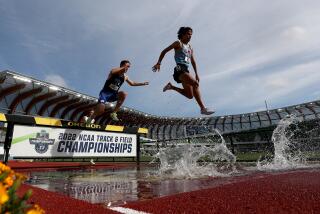Father Casassa, Former Head of Loyola Marymount, Dies
- Share via
Father Charles S. Casassa--a Jesuit adherent for 60 years, a priest for more than 50 and a courageous and innovative administrator at what now is Loyola Marymount University for more than 40--died Wednesday morning at St. John’s Hospital in Santa Monica after a long illness. He was 78.
To many, Casassa was a Southland institution--a civic leader who supported civil rights before such stances were popular, a leader of ecumenism before the breakthroughs of Vatican II, a man whose personal concerns ranged from an intercultural camp for children to a coalition on aging.
For the record:
12:00 a.m. July 14, 1989 For the Record
Los Angeles Times Friday July 14, 1989 Home Edition Part 1 Page 2 Column 6 Metro Desk 1 inches; 28 words Type of Material: Correction
In the obituary Thursday of Father Charles S. Casassa, former chancellor of Loyola Marymount University, the American Jewish Committee was mistakenly identified as the American Jewish Congress.
His principled stands while chancellor at then-Loyola University were legendary.
In 1949, he canceled a university football game with a college that refused to permit Loyola’s blacks to play. That same year, he barred a fraternity that discriminated against minorities from chartering a chapter at Loyola.
In the interests of educational quality and fiscal responsibility, he abolished the university’s football program. He admitted women to the previously all-male undergraduate program at Loyola and, despite some opposition from those in the church hierarchy, oversaw the affiliation that eventually became a merger of Loyola and Marymount universities.
Rabbi Alfred Wolf of the Wilshire Boulevard Temple, who knew Casassa through their mutual efforts to develop religious understanding, said Wednesday that the Jesuit was a man “who stuck his neck out in inter-religious relations when it was not favored by the Catholic hierarchy.
“Father Casassa was the kind of Catholic who anticipated the spirit of the Vatican II Council before (Pope) John XXIII convened it, and he was the first to implement it in this area, at a time when others were reluctant to do so,” Wolf said.
Born in San Francisco, Casassa owed his Irish wit to three of his grandparents and his Italian surname to the fourth.
As a student at St. Ignatius High School in San Francisco, he found the scholastic life, and the Jesuit order that ran the school, appealing. After graduation, he entered the Jesuit seminary at Los Gatos, later studying at two Jesuit universities--Santa Clara and Gonzaga--from which he earned bachelor’s and master’s degrees, and the University of Toronto, where he got his Ph.D.
Chosen as President
He was teaching philosophy at Santa Clara in 1949 when the California province of the Jesuits chose him as president of Loyola.
The school was small then, with only five buildings at its main campus in Westchester and one at the law school campus in downtown Los Angeles. Today, Loyola Marymount has more than 20 buildings in Westchester and four downtown.
Casassa took credit for only 11, pointing out that many of the structures were erected during the administration of his successors. But friends say that after he left the presidency in 1969--assuming first the title of chancellor and later that of chancellor emeritus--he continued to help raise the money that funded the university’s building programs.
It was early in his presidency, back in 1953, that Casassa founded the university’s Summer Workshop in Human Relations. One of its more successful graduates was a young police officer, Tom Bradley.
After that came an interfaith workshop sponsored by Loyola, the American Jewish Congress and the National Council of Christians and Jews.
In 1965, then-Gov. Edmund G. Brown appointed Casassa to the McCone Commission, which studied the causes of the Watts riots earlier that year.
Casassa was still serving as Loyola’s president three years later when Marymount suggested an affiliation of the two schools.
“Marymount had more in art and music; Loyola had more in science, engineering and business administration,” Casassa said. “We felt Marymount could enrich our programs and that we could enrich theirs.”
Marymount moved to Loyola’s Westchester campus in 1969; the two schools merged formally in 1973.
By the time of the merger, Casassa had handed over the reins of the presidency and was serving as chancellor--a job, he said, that primarily involved fund raising and public relations. His duties as chancellor emeritus, a post he assumed in 1984, were much the same, but the university’s current president, Father James M. Loughran, said Casassa also served as a valuable and trusted adviser.
A wake service will be held Sunday at 7:30 p.m. at the Sacred Heart Chapel on the Westchester campus. A Mass of Resurrection will be celebrated Monday at 10 a.m. also at the chapel. Burial will be at the Santa Clara Mission cemetery in Santa Clara on Tuesday morning.
In lieu of flowers, the Jesuit Community has requested contributions to the Casassa Executive Education Conference Center at Loyola Marymount.
More to Read
Sign up for Essential California
The most important California stories and recommendations in your inbox every morning.
You may occasionally receive promotional content from the Los Angeles Times.













